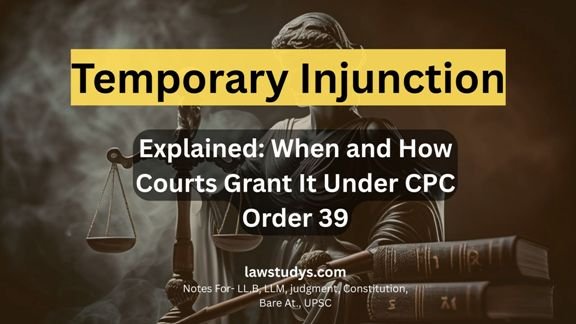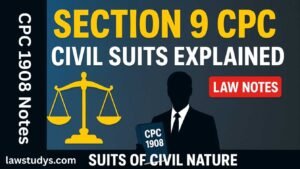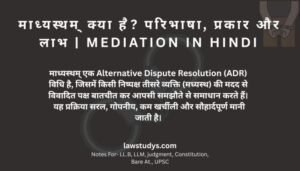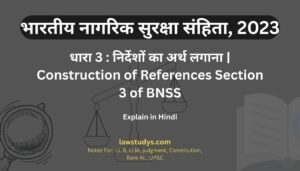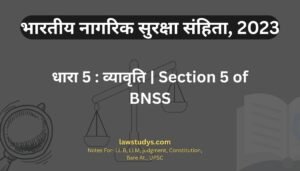In this article when and under what conditions a temporary injunction can be issued under CPC. Along with the discussion of the principles for granting temporary injunction by the civil court, it has also been explained whether the temporary injunction can be changed.
If you are a lawyer, law student or preparing for judicial competitive examination, then you need to know about ‘Temporary Injunction’ –
What is temporary injunction
Temporary injunction means a judicial order by which a party is required to do or not to do a specific act. Temporary injunction is granted by the court to maintain the disputed property in status quo till the final decision of the case.
The effect of this injunction remains till the final decision of the case or the further order of the court. Its main objective is to protect, preserve and preserve the property in dispute during the pendency of the suit.
The injunction prescribed in Order 39 of the Code of Civil Procedure, 1908 means this temporary injunction.
Provisions related to the subject matter of temporary injunction have been made in Rules 1 to 5 of Order 39 of the Code.
Temporary injunction determines the fate of the case, therefore, while issuing temporary injunction, utmost care and vigilance should be taken and such measures should also be taken so that justice can be done to both the parties.
Along with this, while issuing temporary injunction, the court should study the pleadings thoroughly, because pleadings have immense importance in the administration of civil justice.
This is a mere order of the Court, which can be given without hearing the defendant on the application of the plaintiff during the suit, or before serving the summons on the defendant, and the Honorable Court may, on the application of the plaintiff, for a certain time or after the suit Can order temporary injunction till final decision.
Read Also – What is Criminology : Introduction, Definition, Importance
When can a temporary injunction be granted?
Order 39 Rule 1 of the Code of Civil Procedure, 1908 mentions the circumstances in which the court can grant/issue a temporary injunction against the defendant. The provisions of Order 39 Rule 1 of the Code are as follows –
(a) When in any suit it is proved by affidavit or otherwise that –
(i) the property in dispute is in danger of being destroyed, damaged or transferred by any party to the suit, or
(ii) the defendant threatens or intends to remove or dispose of his property in order to defraud the creditors, or
(iii) The defendant threatens to deprive the plaintiff of the suit property or otherwise damage it.
In the situations mentioned above, the court may issue a temporary injunction to restrain or prevent the property from being destroyed, damaged, otherwise transferred, sold, removed, converted, taken into ownership, etc., until the final disposal of the case or until further orders. Can.
Read Also – What is the Schools of Criminology And how many Types are there? – Criminology
Under Order 39 Rule 1 (a) of CPC, such an injunction can also be issued in favor of the defendant if the plaintiff destroys, damages or disposes of the suit property.
While issuing injunction under Order 39 Rule 2 (b), conditions of keeping an account and giving security can be imposed by the court.
Case – Ispal Singh vs. Smt. Ranjit (A.I.R. 2011, (N.O.C.) 377 Bombay)
In relation to the wife residing in the residential house involved in this case, the wife submitted an application against the husband for an injunction to stop her from entering the house. While accepting the application, the court said that it is not necessary for the wife to prove her ownership of such a residential house.
Case – Super Cantt Industries vs Music Broadcast Pvt. Service (AIR 2012 S.No. 2144)
In this case, the Honorable Court clarified that, while issuing temporary injunction, the courts should keep the situation as it is with a view to protect the disputed property so that the successful party can get its benefit.
In the case of Jack Industries vs. Anis Fatma Begum, the court decided that unless a prima facie case, irreparable loss and balance of convenience does not arise in the case, a temporary injunction cannot be issued. Therefore, there are the following general principles for issuing this injunction –
Read Also – What do you understand by juvenile delinquency? Its causes and treatment
Main principle of temporary injunction
(i) Prima Facie Case
The first principle for issuing temporary injunction is that the plaintiff is entitled to obtain relief on the basis of the evidence available before the court. Thus, a prima facie case means the possibility of a bona fide dispute between the parties to the case and the possibility of the plaintiff getting success in it.
While determining the prima facie case, the court considers the evidence of both the parties. For temporary injunction, it is not necessary for the plaintiff to prove prima facie title in the suit, but it is necessary to prove the prima facie case, which is substantial before the court.
There is a question on the basis of investigation of which a decision can be given on its merits and demerits.
In the case of Smt. Vimla Devi vs. Jung Bahadur, it has been held by the Court that for a temporary injunction, it is necessary for the party to have a prima facie case. Here, prima facie case means the possibility of the plaintiff getting the remedy. (A.I.R. 1977 Rajasthan 196)
In the case of Kundan Singh Narpat Singh Rajput vs Alok Kanwar, issuing a temporary injunction even though there was no prima facie case was considered erroneous. (A.I.R. 2018 NO.C. 421 Rajasthan)
Read Also – Ideology of Criminology and its different types | Criminology Notes
(ii) Irreparable Loss
The second principle for issuing temporary injunction is irreparable harm. Irreparable loss means such loss which may be caused to the plaintiff if injunction is not issued in his favor and which is not possible to be evaluated in money.
It can also be defined in such a way that, if an injunction is not issued in favor of the plaintiff, the plaintiff may be deprived of his rights forever.
(iii) Balance of Convenience
The third principle of temporary injunction is balance of convenience. Balance of convenience means that if the injunction is not issued, the plaintiff will be more inconvenienced than the defendant.
While issuing an injunction, the court has to keep in mind the balance of convenience. If the balance of convenience is not in favor of the plaintiff then an injunction cannot be issued in his favor.
In this regard, there is a quotable case of ‘Ushaben Navinchandra Trivedi vs. Bhagyalakshmi Chitra Mandir’. In this, an injunction was sought against the screening of the film ‘Jai Santoshi Maa’ on the grounds that it is going to hurt the religious sentiments of Hindus, its screening should be stopped. But the court did not find so.
The court refused to issue an injunction considering the balance of convenience in favor of its performance. (A.I.R. 1978 Gujarat 13)
In the case of Prem Kumar Dhai vs. Dr. Bir Bhan Garg, it has also been said that unless the balance of convenience is in favor of the applicant, temporary injunction should not be granted. (A.I.R. 2005 Punjab and Haryana 193)
According to the case of Nagarao vs. Nagpur Improvement Trust, it is necessary to follow the above three principles for issuing temporary injunction. If any one of the three principles of injunction is not fulfilled then a temporary injunction should not be issued.
Read Also – The ancient judicial system prevalent during the Hindu period in India before the arrival of the British
Amendment of order of temporary injunction
In Order 39 Rule 4 of the Code, provision has been made regarding discharging, changing or setting aside the order of injunction. An order of temporary injunction can be discharged, varied or set aside in the following circumstances –
(a) Where material particulars have been concealed or false or misleading statements have been made in order to obtain a temporary injunction, the court may vacate the order of injunction,
(b) Where there has been a change in the circumstances after the issue of a temporary injunction, the order of injunction may be modified or set aside by the court accordingly;
(c) Where the court is satisfied that the order of temporary injunction is causing hardship to the party, such order may be discharged, varied or set aside or
(d) On application by a party dissatisfied with the order, such order may be discharged, varied or set aside.
in the case of S. Rajinder Singh vs S. Dalip Singh (A.I.R. 2000 Delhi 228) It has been held by the Delhi High Court that, if a person obtains an ex-parte injunction by suppressing the true facts. Therefore it should be kept separate.
Consequences of breach of temporary injunction
It is the duty of every party to comply with the injunction. If any party disobeys or breaches it, its consequences are mentioned in Order 39 Rule 2A. According to this, if any party disobeys or violates the injunction then –
(a) His property can be attached. Such attachment will remain in effect for one year. If the disobedience or breach continues even after this, the property can be sold and the party harmed can be compensated.
(b) he may be detained in civil prison for a period not exceeding three months; Or
(c) He may be punished for contempt of court.
In the case of Margao Municipal Council vs. Pandurang Kusta, the need has been expressed to prove the clarity of the order for disobeying the injunction and to exhibit such order in the court. (A.I.R. 2000 Mumbai 78)
Reference – Book Civil Procedure Code Fourth Edition (Dr. Radha Raman Gupta)
Disclaimer :- This notes is intended to provide information only. If you are seeking advice on any matters relating to information on this website, you should – where appropriate – contact us directly with your specific query. However, we may have made mistakes and we will not be responsible for any loss or damage of any kind arising because of the usage of this information.
